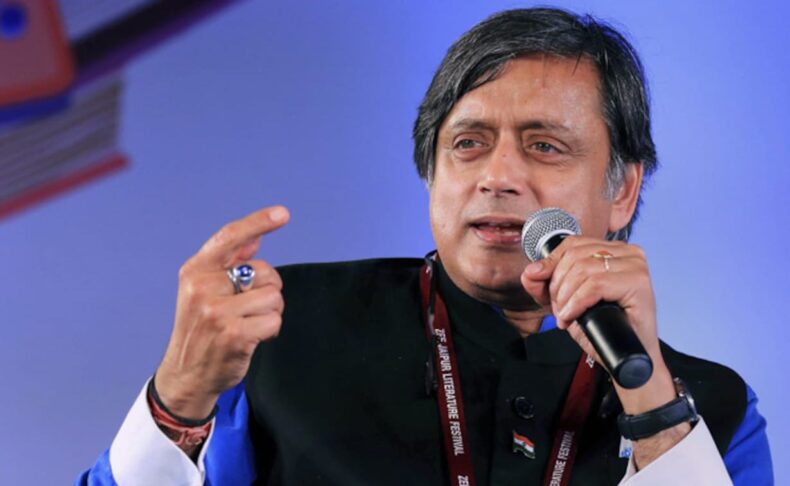Senior Congress leader Shashi Tharoor recently criticized the ruling BJP for advocating the use of ‘Bharat’ as the official name for the country, contrasting it with the English name ‘India.’ This criticism arose following the opposition bloc’s decision to name their alliance ‘INDIA,’ an acronym for the Indian National Developmental Inclusive Alliance. Tharoor suggested that the BJP might reconsider their push for name changes if opposition parties rename their alliance as the Alliance for Betterment, Harmony, and Responsible Advancement for Tomorrow, abbreviated as BHARAT.
The ongoing debate surrounding the country’s official name gained momentum when the government sent out G20 dinner invitations to world leaders in the name of the ‘President of Bharat‘ instead of the conventional ‘President of India.’ This seemingly minor shift in nomenclature sparked a political row of considerable proportions.
The move to use ‘Bharat’ on the G20 invitations instead of ‘India’ raised questions about the government’s intentions and fuelled the debate over linguistic and cultural identity. Critics argued that the alteration, though symbolic, had significant implications. It was perceived as a conscious effort to prioritise ‘Bharat’ over ‘India’ and reinforce the notion of embracing the nation’s ancient heritage.
Shashi Tharoor’s lighthearted suggestion of ‘BHARAT’ as an acronym for the opposition alliance reflects the multifaceted nature of this debate. While some see it as a matter of cultural preservation and identity, others view it through a political lens, suspecting ulterior motives behind the proposed name change.
ALSO READ: PM Modi praised ‘Exemplary’ by Shashi Tharoor to Outreach Muslim World
The debate over the country’s name is not new. It has surfaced periodically throughout India’s history, with various political and cultural considerations playing a role. The name ‘India’ itself has its roots in historical usage, stemming from the Greek term ‘Indica,’ and has been used for centuries to describe the subcontinent. On the other hand, ‘Bharat’ carries a strong cultural significance, tracing its origins to ancient Sanskrit literature and evoking a sense of heritage and tradition.
Proponents of ‘Bharat’ argue that it is an emblem of the country’s rich history and should be given precedence. They see it as a means of fostering a stronger connection between citizens and their cultural roots, potentially promoting unity.
However, critics maintain that such a change could be costly and logistically challenging, necessitating adjustments to official documents, currency, and more. Additionally, they emphasize the importance of maintaining the name ‘India’ for consistency on the international stage and to avoid confusion among foreign nations.
The government’s decision to use ‘Bharat’ on the G20 invitations undoubtedly added fuel to the already simmering debate. It remains to be seen how this discourse will evolve and whether any concrete steps will be taken to officially alter the country’s name.
In the midst of this lively debate, Shashi Tharoor’s witty proposal serves as a reminder that India’s identity and nomenclature are complex issues that go beyond mere semantics. They touch upon cultural, political, and historical aspects, making them a topic of ongoing interest and discussion in the country’s vibrant political landscape.
Shashi Tharoor previously mentioned that there is no constitutional issue with using the name ‘Bharat’ for India, but he cautioned against entirely abandoning the term ‘India.’ He suggested using both ‘India’ and ‘Bharat’ to refer to the country and emphasized the importance of retaining a name with historical significance.
He further emphasized the importance of retaining both names, saying, “We should continue to use both words rather than relinquish our claim to a name redolent of history, a name that is recognized around the world.”
Meanwhile, Mayawati, the chief of the Bahujan Samaj Party, called for the Supreme Court to take suo motu cognizance of what she referred to as “shallow politics” surrounding the terms ‘Bharat’ and ‘INDIA.’ She urged for a ban on all political entities formed in the name of the country during a press conference in Lucknow. Mayawati stated, “The Supreme Court should take suo motu cognizance of the shallow politics being done on ‘Bharat’ and ‘INDIA’ and ban all organizations, parties, and alliances formed in the name of the country.”
She remarked, “Bharat, also known as India, is a well-established and respected constitutional name. The people of the country, hailing from various castes and religions, hold profound love and respect for Baba Saheb Bhimrao Ambedkar’s sacred and altruistic Constitution. It would be highly inappropriate to manipulate or change it, as it could play with their sentiments.”












